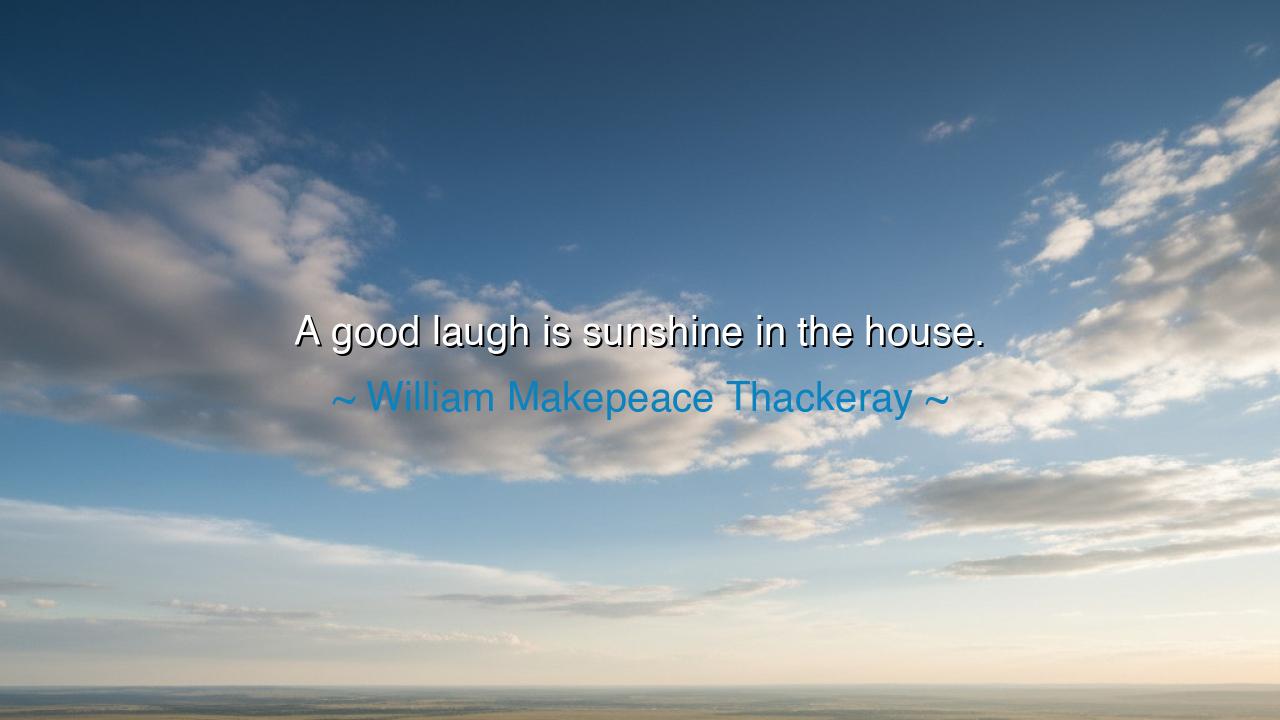
A good laugh is sunshine in the house.






Hear, O children of joy and sorrow alike, the words of William Makepeace Thackeray, who proclaimed: “A good laugh is sunshine in the house.” In these few words, the poet of the human condition speaks of laughter as more than sound—it is light, warmth, and blessing. Where gloom lingers, where silence grows heavy, the burst of laughter enters like the sun breaking through storm clouds, scattering darkness and renewing the spirit of all who dwell within.
The meaning of this teaching is profound in its simplicity. A good laugh is not merely a fleeting pleasure; it is healing, it is strength, it is shared life. Just as sunshine enters a house to brighten, to warm, and to nourish, so laughter fills the heart with hope, strengthens the body, and binds souls together in unity. Houses without laughter are like tombs, but those filled with mirth are alive with the pulse of love and community.
The origin of these words lies in Thackeray’s deep understanding of human nature. As a novelist and satirist, he saw the weight of sorrow and the folly of pride. Yet he also knew that laughter has the power to ease burdens, to break chains of bitterness, and to remind men and women of their shared humanity. His words echo an ancient truth: that joy is not only a gift from the gods but a weapon against despair.
Consider the story of Abraham Lincoln, who, in the midst of civil war, bore the heaviest burdens of leadership. His cabinet, weighed with grim matters of life and death, often marveled at how Lincoln would read aloud humorous stories or share jokes before grave meetings. Some criticized him for it, but he replied, “If I did not laugh, I should die.” His good laugh was indeed sunshine in the house of government, lifting spirits so they could endure the darkest hours of the nation.
Think also of Anne Frank, who, hidden away in fear and danger, still found joy in writing about small, humorous moments of her confined life. Even amidst shadows, her laughter and wit illuminated the pages of her diary. It was her sunshine in the house, keeping despair at bay and reminding her family of hope. Her example reveals that laughter is not a denial of hardship, but a refusal to let hardship have the final word.
O seekers of wisdom, understand this: laughter is not trivial. It is sacred. It is the language of resilience, the shield of the weary, and the bond of the broken. When you laugh together, you remember that you are alive, that you are not alone, that light yet dwells within the heart. The house filled with laughter becomes a sanctuary, a place where love and warmth cannot be extinguished.
Practical wisdom calls you: cultivate laughter in your homes and in your gatherings. Tell stories that lighten hearts, share smiles even in trial, and do not fear to laugh at your own folly. Seek companions who bring sunshine rather than clouds, and be yourself a source of joy to others. For one moment of laughter can lift a soul weighed by years of grief, and one shared smile can turn strangers into family.
Therefore, remember Thackeray’s counsel: “A good laugh is sunshine in the house.” Cherish laughter not as trivial noise but as the very light of life. For just as no house can flourish without the sun, no heart can flourish without joy. Carry laughter into your days, and you shall carry with it the warmth of hope, the strength of resilience, and the brightness of love.
––






GDGold D.dragon
I find this quote both simple and profound. It’s a reminder that happiness doesn’t always come from big achievements or possessions but from small, joyful moments. Still, I can’t help but wonder—what makes some people naturally more inclined to laugh easily while others struggle to find joy? Is it personality, upbringing, or perspective? Perhaps the ability to laugh is itself a form of emotional strength we can nurture.
KLDang Khanh Linh
The metaphor of laughter as sunshine really resonates with me because it suggests warmth, brightness, and renewal. I think it’s true that laughter has a way of dissolving negativity. But it also raises a question—what about people who live alone or in difficult circumstances? How can they bring that ‘sunshine’ into their own lives without others around to share it with? Maybe humor can still exist in solitude, just in a quieter form.
MDNguyen Nhuoc Minh Duc
This sentiment feels timeless. Every culture values laughter, yet we often underestimate its importance in our homes. I wonder if modern life—with technology, stress, and constant busyness—has made genuine laughter less frequent. How can families today create an environment where laughter happens more often? Maybe it’s not about being funny, but about being present and open enough to share joy together.
TDThom Do
Reading this makes me think of how laughter brings people together. Even in moments of tension or sadness, one shared laugh can make everything feel lighter. But I’m curious—what is it about laughter that has such a powerful emotional impact? Is it purely psychological, or does it have real physiological benefits? It’s fascinating how something so spontaneous can play such a vital role in emotional health.
NHNgoc Han
I love the imagery here—it feels so bright and comforting. Still, I wonder if laughter can sometimes mask deeper issues in relationships or families. Can too much joking become a way to avoid serious conversations? It’s interesting to think about when laughter is healing versus when it’s a distraction. How can we tell the difference between genuine joy and humor used as emotional protection?